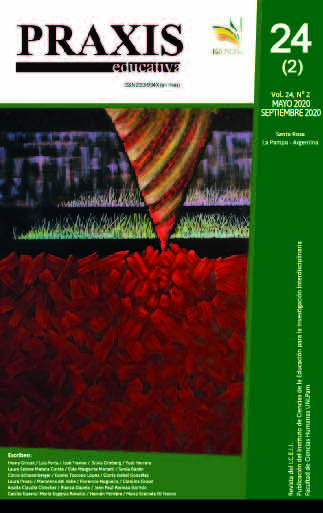University admission: from selective examination to unrestricted admission. Comparative study of academic performance according to the admission modality of an Argentinian national university. Democratization or massification?
DOI:
https://doi.org/10.19137/DOI:%20https://dx.doi.org/10.19137/praxiseducativa-2020-240207Keywords:
academic admission, university, educational policy, democratization of education, academic dropout.Abstract
There has been an increase in enrollment in higher educationas a result of educational democratization.Consequently, university admission criteria have been affected. However, in Argentina, where national public universities are completely free, graduation rates have not shown increases proportional to those observed in enrollment. Thus, the aim of the study was to compare the educational trajectory of two cohorts of students of an Argentine national university based on the characteristics of their admission: eliminatory (traditional examination modality) or unrestricted (without exam). A probabilistic sample of 445 students was used: 198 of the students entered through the traditional examination modality (2014) and 245 entered through the unrestricted modality (2015). The results indicate a divergence in educational trajectories, with higher performance indicators for the 2014 cohort. The findings represent a contribution to the study of the democratization policies of higher education.
Downloads
References
Banco Mundial (2017). Tertiary Gross Enrollment Ratio. Recuperado de: http://data.worldbank.org/indicator/%20SE.TER.ENRR
Bourdieu, P. (2005). Capital cultural, escuela y espacio social. Buenos Aires: Siglo XXI.
Carlino, P. (2004). La distancia que separa la evaluación escrita frecuente de la deseable. Universidad de Los Andes (ULA).
Carlino, P. (2005). Escribir, leer y aprender en la universidad: una introducción a la alfabetización académica. Buenos Aires: Fondo de Cultura Económica.
Coschiza, C. C., Fernández, J. M., Redcozub, G. G., Nievas, M. E., y Ruiz, H. E. (2016). Características socioeconómicas y rendimiento académico. El caso de una universidad argentina. REICE. Revista Iberoamericana sobre Calidad, Eficacia y Cambio en Educación, 14(3), 51-76.
Ezcurra, A. M. (coord.) (2019). Derecho a la educación. Expansión y desigualdad: tendencias y políticas en Argentina y América Latina. Buenos Aires: UNTREF.
Ezcurra, A. M. (2011). Masificación y Enseñanza Superior: una inclusión excluyente. En N. Fernández Lamarra y M. F. Costa de Paula (Comps.), La democratización de la educación superior en Américo Latina (pp. 60-72). Buenos Aires: EDUNTREF.
Fernández Lamarra, N., y Costa de Paula, M.F. (coords.) (2002). La democratización de la educación superior en América Latina. Límites y Posibilidades. Buenos Aires, Argentina: EDUNTREF.
García de Fanelli, A. M. (2014). Rendimiento académico y abandono universitario: Modelos, resultados y alcances de la producción académica en la Argentina. Revista Argentina de Educación Superior, 8, 9-38.
López Segrera, F. (2016). Educación Superior Comparada: tendencias mundiales y de América latina y Caribe. Revista de Avaliacao Superior, 21(1), 13-32. https://doi.org/10.1590/S1414-40772016000100002
Martínez, S. (2011). ¿Igualdad de oportunidades? Un desafío de la Enseñanza Superior. Estudiantes y mediaciones para la enseñanza. En Martínez, S. (comp.), Democratización de la universidad: investigaciones y experiencias sobre el acceso y la permanencia de los/as estudiantes (pp. 19-54). Neuquén: EDUCO - Universidad Nacional del Comahue.
Parrino, M. C. (2010). Deserción en el primer año universitario. Dificultades y logros. X Coloquio Internacional sobre Gestión Universitaria en América del Sur. Mar del Plata, Argentina.
Perrenoud, Ph. (2006). El oficio de ser alumno y el sentido del trabajo escolar. Madrid: Popular.
Plotno, G. S. (2009). Un estudio sobre ingreso y deserción en la uba. In XXVII Congreso alas. Latinoamérica Interrogada. UBA. Facultad de Ciencias Sociales. Buenos Aires.
Tinto, V. (2012). Completing College: Rethinking Institutional Action. Chicago: University of Chicago Press.
Downloads
Published
Issue
Section
License
Copyright Notice
Editorial Committee Educational Praxis Magazine:
I hereby declare that I am the author of the article titled (article name), that it is original and my own and that it was not previously published in any other format or medium. I declare to know that the magazine will not charge me any type of fee under any circumstances, nor will I receive any type of monetary compensation If it were accepted for publication in Educational Praxis, I authorize the aforementioned magazine to publish it digitally and to advertise it on its social networks.
If the work is published, I adhere to the Creative Commons license called "Attribution - Non-Commercial Share Alike CC BY-NC-SA", through which it is allowed to copy, reproduce, distribute, publicly communicate the work and generate derivative works, as long as when the original author is cited and acknowledged. This license has been used since September 2018. In 2016 CC BY NC ND 4.0 was adhered to; and in the years 2017 and 2018 (January-August) CC BY NC 4.0.
This CC BY-NC-SA Share Alike license does not, however, permit commercial use of the work. As an author, the journal may establish additional agreements for the non-exclusive distribution of the version of the work published in the journal, it allows me to self-archive the published articles, in their post-print version, in institutional, thematic repositories, personal web pages or any other relevant use. with the recognition of having been first published in this journal.
Educational Praxis adheres to DORA (Declaration on Research Assessment) signed in San Francisco, California, on December 16, 2012, and to the Declaration of Mexico (Joint Declaration LATINDEX - REDALYC - CLACSO - IBICT).















_(1)2.png)


3.png)











_(2).png)






2.jpg)









